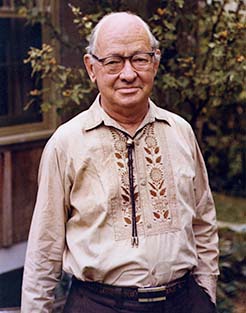Herbert J. Muller
* Deceased
Distinguished Service Professor of English (Emeritus) - 1959

Herbert Muller received a B.A., M.A., and Ph.D. from Cornell University. A distinguished and well-known writer and teacher, Muller taught English at Cornell after graduating before moving on to Purdue University in 1935. While teaching English there, Muller rose from instructor to full professor in ten years.
In 1953, Muller joined Indiana University. After serving first as a visiting critic, he moved from Lafayette to Bloomington in 1956 when he was appointed Professor of English and Government- a rank he held for three years until he was named Distinguished Professor of English and Government in 1959. Muller’s broad interests and constant intellectual inquiry into many aspects of human thought and behavior explain his joint appointment at IU (although by 1968 he had relinquished his connection with the government department) and also his wide appeal to readers; whatever the range or the focus away from literature itself, at the root of his studies was always Herb Muller, the humanist. As Distinguished Professor Emeritus of English, Muller retired in 1973. The titles of Muller’s fourteen book-length publications display a shift in his interest and discipline away from the strictly literary studies of the modern novel and of tragedy to interdisciplinary studies in literature and science, history and freedom, science and technology. Many would agree Muller’s most ambitious work culminated in a three-volume study of freedom. During his years of teaching and writing Muller also held two additional visiting professorships, twice at the University of Istanbul, 1947-47 and 1951-51, and at New York University, 1958-59.
Muller was recognized by numerous accolades and awards. He received a Guggenheim Fellowship in 1939-40; a grant from the Fund for the Republic in 1957 to work on the papers of Lord Acton; Sigma Delta Chi's Brown Derby for the most popular teacher at Indiana University at 1957; in 1960 a grant from the Rockefeller Foundation to work on the history of freedom and that same year a fellowship at the Center for Advanced Studies in the Behavioral Sciences at Stanford. Purdue University awarded Muller wirh an honorary degree in 1961. Muller’s Uses of the Past (1957) was selected by the New York Times in 1960 as one of the books from the past decade likely to be read for pleasure and critically admired twenty-five years. His first freedom volume, Freedom in the Ancient World, won in 1962 the Phi Beta Kappa award in history, philosophy, and religion. His Religion and Freedom in the Modern World won the Frederick G. Melcher award in 1964.

